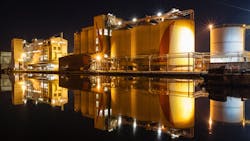Case study: Ecolab, Cargill collaborate to pioneer water sustainability through wastewater treatment and recycling
Cargill is a world-renowned producer of edible oils, including organic, non-GMO sunflower oil and non-GMO soybean oil. One of its production facilities in France relies heavily on water, using it as a raw material, cleaning agent and feedwater for utilities and operations. Persistent droughts and increasing government regulations intensified Cargill’s focus on water conservation in the region, and the company sought solutions that would help decrease its freshwater consumption while maintaining operational stability and reliability.
To address this challenge, Cargill joined forces with Nalco Water, Ecolab’s water and process management business. A trusted partner for millions of customers, Ecolab is a global sustainability leader offering water, hygiene and infection prevention solutions and services in more than 170 countries around the world. Ecolab has been a longstanding collaborator with Cargill, supporting utility systems like steam and cooling operations. The Ecolab team initiated an in-depth analysis of Cargill’s water systems and found that its effluent wastewater discharge was high quality and abundant, making it a critical opportunity for a new recycling program.
Based on experience across more than 40 industries, Ecolab surmised that the treated effluent could be reused in the plant’s cooling water system, which was relying on freshwater for utility operations. If Cargill could recycle wastewater and reuse it to cool utility processes, then it would significantly reduce its freshwater needs while also minimizing wastewater discharge at the plant. Ecolab worked with Cargill to build and implement a new process by first installing a pumping and collection station to intercept wastewater before it was discharged into the municipal sewer system. Next, the companies implemented robust monitoring and control solutions to manage the water’s quality.
Utilizing Nalco Water’s Oxidant Controller program, the Ecolab team began monitoring and regulating microbiological levels to mitigate harmful microorganisms in the recycled water, like bacteria, fungi, algae and yeast. The system works by routinely examining and controlling the levels of free chlorine in the water, a disinfectant that eliminates bacteria and viruses. Ecolab also employed its 3D TRASAR technology for wastewater to supervise and manage critical performance parameters, such as scale, corrosion and microbial fouling. This system helps prevent potential damage, such as water flow obstruction, heat transfer inefficiency and biofouling, which ensures the endurance and efficiency of the water recycling process.
The payoff
After one year, the outcomes were remarkable — 93% of the Cargill plant’s wastewater was recycled for use in the cooling system, resulting in a 53% decrease of the freshwater consumption in the cooling system. Additionally, the plant's wastewater discharge to the municipal sewer system saw a 93% drop, significantly improving the company’s environmental impact on the surrounding community.
Consistent and reliable control over water quality parameters ensured the recycling program’s success. The program prioritized key water quality aspects in the cooling system, such as scale conditions, pH levels and total hardness. It also managed the chemical oxygen demand (COD), which serves as an indicator of organic load and potential microbial issues, ensuring the water quality remained at optimal levels throughout the process.
Cargill’s success with Ecolab’s water management program is a compelling illustration of how industries can address water scarcity. Through strategic collaboration and technologies, the plant has significantly reduced its freshwater usage and wastewater discharge, all while maintaining production quality.
In an era grappling with considerable environmental challenges, Cargill's journey offers an example for other organizations striving for a balance between economic growth and increased environmental sustainability.
Eric Makela serves as a Vice President, Global Accounts for Ecolab’s Food and Beverage division. He oversees critical corporate relationships at an enterprise level, and he collaborates with customers to enhance and optimize operations across their entire network. He joined Ecolab in 2002 in the Pest Elimination department and has had a diverse 21-year career with Ecolab. Eric has built his career in various different operations, sales, and leadership roles in Ecolab’s industrial businesses. He has spent the majority of his career working with and supporting a wide array of customers in the food, beverage and agribusiness industries to deliver solutions for their sustainability, operational, sanitation, quality and food safety challenges. Eric has a Bachelor’s degree in Consumer Affairs / Business and Finance from the University of Wisconsin-Madison.
About the Author
Eric Makela
VP, Global Accounts, Food and Beverage Global Solutions, Ecolab
Eric Makela serves as a Vice President, Global Accounts for Ecolab’s Food and Beverage division. He oversees critical corporate relationships at an enterprise level, and he collaborates with customers to enhance and optimize operations across their entire network. He joined Ecolab in 2002 in the Pest Elimination department and has had a diverse 21-year career with Ecolab. Eric has built his career in various different operations, sales, and leadership roles in Ecolab’s industrial businesses. He has spent the majority of his career working with and supporting a wide array of customers in the food, beverage and agribusiness industries to deliver solutions for their sustainability, operational, sanitation, quality and food safety challenges. Eric has a Bachelor’s degree in Consumer Affairs / Business and Finance from the University of Wisconsin-Madison.

